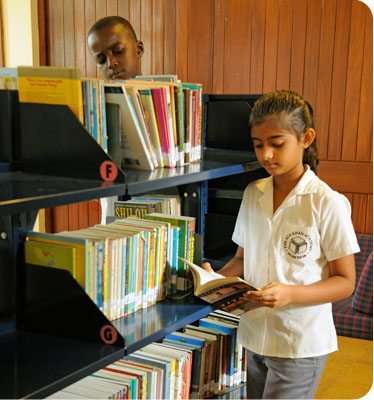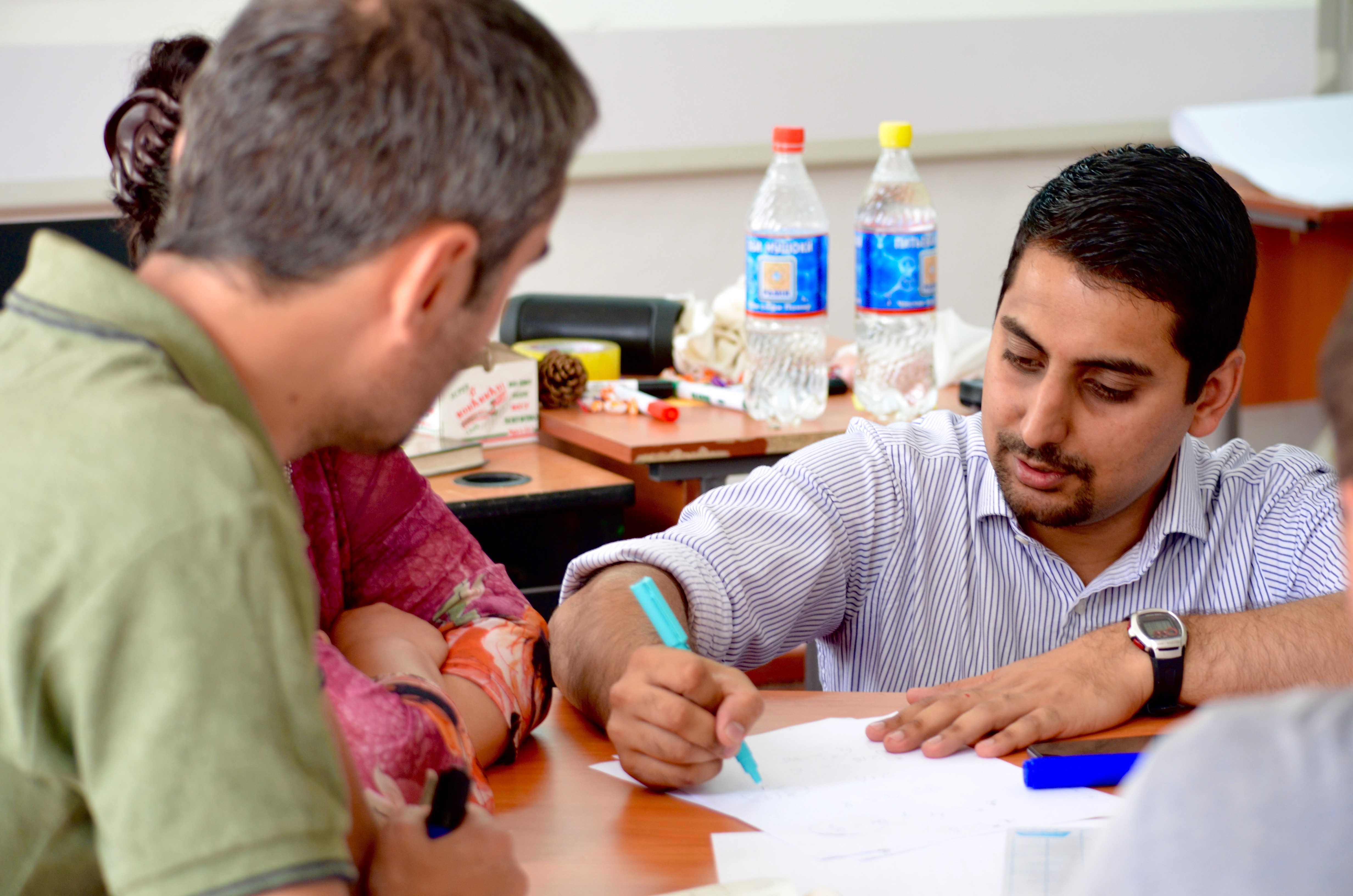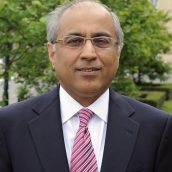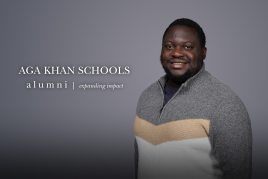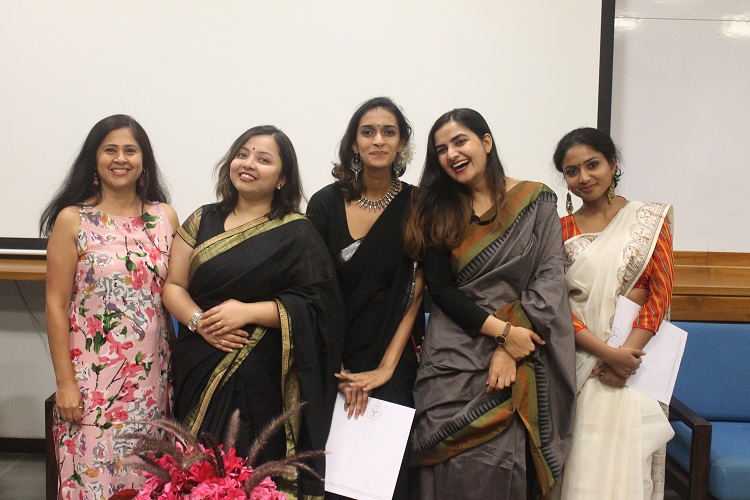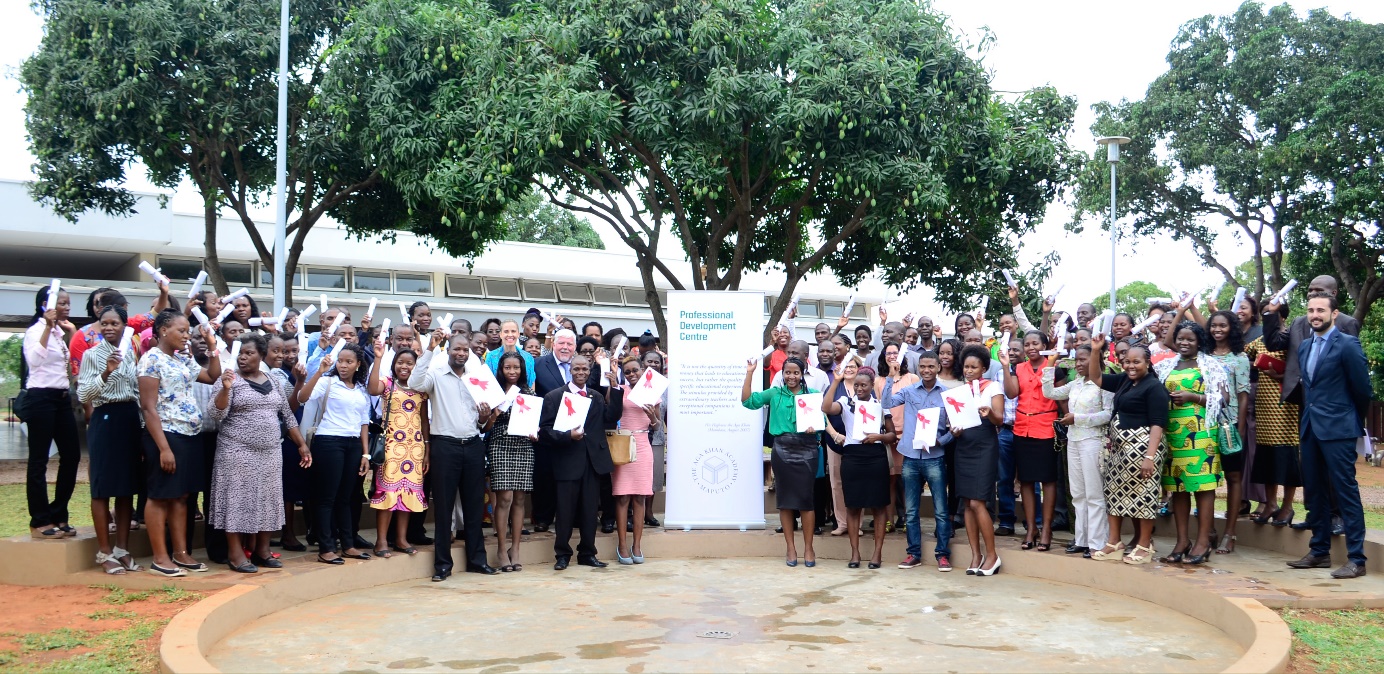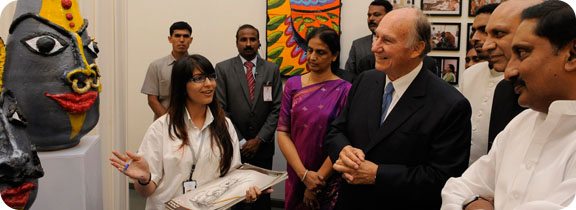
Vision
The outlook and educational perspectives of the Aga Khan Academies are based on the vision of His Highness the Aga Khan. His vision looks to education of the highest quality that can prepare young people to lead and enact positive change in the world they inhabit.
The text below, drawn from the Foreword to Excellence in Education (Aga Khan Academies, 2003), outlines the vision of His Highness for the Aga Khan Academies.
A time of change
"We live in a time of rapid change — change that is often unpredictable and not always positive. My experience with development, as an observer and a practitioner, has led me to the conclusion that the best way to manage change, whether positive or negative, is to prepare for it and that there is no greater form of preparation for change than investments in education. These investments must focus, of course, on teachers of the highest quality — teachers who are creative and committed to their own life-long learning and self-improvement. It also means investments in facilities that provide an environment conducive to the less tangible but equally important elements of an education — self-esteem, leadership, tolerance, ethical judgment and moral reasoning."
What does it mean to be educated?
“However, as educators and parents have begun to make these investments, they are revisiting the age-old question: What does it mean to be an educated person? Many have come to realise that education must prepare students not only for the job market, but also for life.
From Zanzibar's madrassas to Britain's public schools, from American university preparatory academies to government schools in Pakistan, there is a realisation that education must equip students with more than a narrowly focused curriculum based on reading, writing and mathematics. It must expose students to a broad and meaningful study of the humanities, including science, music and art. The teaching of history and world civilisations must be more broadly representative of the world's entire heritage than it has in the past. This is especially true in regard to Islamic civilisations, which have been misrepresented or ignored despite their vital contributions in a wide range of spheres, from science to architecture.
Education must include mastery of more than one language and an ability to communicate effectively in those languages. In the face of the most rapid advances in technology in history, education also must teach students how to master information technologies. These skills now form a critical part of the learning process, as well as essential qualifications for application in the workplace, but even these elements are not enough."
Preparing children for life
“An education must equip students with the tools that enable them to adapt and thrive, in a world characterised by change. In such an environment, technical proficiency is not enough. Education that prepares children for life must go beyond fundamental skills to stimulate creativity, intellectual curiosity and honest inquiry. Advancement and development, both personal and societal, are dependant on these elements. Innovation and progress arise from the ability to approach a challenge in a new way and offer a solution."
A pluralistic outlook
“Education must also make the case for a pluralistic tradition in which other views, ethnicities, religions and perspectives are valued not only because that is just and good, but also because pluralism is the climate best suited for creativity, curiosity and inquiry to thrive. It must also stimulate students to consider a variety of perspectives on some of the fundamental questions posed by the human condition: 'What is truth?' 'What is reality?' and 'What are my duties to my fellow man, to my country and to God?' At the same time, education must reinforce the foundations of identity in such a way as to reinvigorate and strengthen them so that they can withstand the shock of change."
The most important measure of an education
“What students know is therefore no longer the most important measure of an education. The true test is the ability of students and graduates to engage with what they do not know and to work out a solution. They must also be able to reach conclusions that constitute the basis for informed judgements. The ability to make judgements that are grounded in solid information and employ careful analysis, should be one of the most important goals for any educational endeavour. As students develop this capability, they can begin to grapple with the most important and difficult step: to learn to place such judgements in an ethical framework.
“For all these reasons, there is no better investment that individuals, parents and the nation can make than an investment in education of the highest possible quality. Such investments are reflected and endure, in the formation of the kind of social conscience that our world so desperately needs."
His Highness the Aga Khan
Access the biography of His Highness the Aga Khan on the Aga Khan Development Network website.
Videos
The Aga Khan Academy Maputo is committed to developing future leaders by delivering Excellence in Education. We offer merit-based admission to our International Baccalaureate (IB) programme at our purpose-built world-class campus in Maputo, Mozambique. Watch our newly released video to learn more about our unique offering.
The International Baccalaureate featured the Aga Khan Academies and our approach to creating home-grown leaders as part of their 50th anniversary commemoration. Watch to learn how the Academies work to transform the communities in which they are located.
This is Abdirahman, a student at the Aga Khan Academy Mombasa. During his time at the Academy, he explored his wide-ranging abilities and developed an initiative that helped change the lives of young girls in Mombasa.
Meet Abdalla, a Somali student from the Aga Khan Academy Mombasa. He shares his journey of self-discovery: Abdalla solidified his multiple identities, fostered his strengths, and created positive social change during his years at the Academy.
Women and girls are strong, fearless, courageous, limitless, and powerful. The Aga Khan Academy Hyderabad celebrated International Women's Day on 8 March 2018 with this video.
Video by AFD – Agence Française de Développement about how children at the Aga Khan Academy Maputo "Dare to Dream Big" in their new school facilities. The Aga Khan Academy in Maputo, Mozambique has been growing since it opened its doors in 2013. The second phase extension was completed in early 2018 and included bigger classrooms, extended outdoor play areas, a library, an art room and a science lab.
This is Mercy, a teacher at the Aga Khan Academy Mombasa who joined through the Teacher Preparation Programme. Mercy fosters profound and meaningful relationships with everyone around her and consistently encourages her students to be the best versions of themselves.
Meet Sadiq, a student at the Aga Khan Academy Mombasa. Open-mindedness, confidence and time management are some of the many characteristics he has developed at the Academy that will help him achieve his dream of becoming a journalist.
Meet Saumya, a student at the Aga Khan Academy Mombasa. A musician and a leader, she shares her wisdom on what it means to make a true positive impact.
Introducing Ivy, a student at the Aga Khan Academy Mombasa. Her innate drive for self-growth and desire to give back to the community makes her a true home-grown leader.
Meet Felix, a student at the Aga Khan Academy Mombasa. With a keen early interest in science, he shares his dreams for the future and explains how the Academies have helped foster his ambitions.
This is Stephen, a student at the Aga Khan Academy Mombasa. His passion for community service shines as he expresses the growth in perspective he experienced through his education at the Academy.
A day at the Aga Khan Academy Mombasa's Junior School, seen through the eyes of the students.
Students and teachers from the Aga Khan Academy Hyderabad are featured in this film from the International Baccalaureate about the Middle Years Programme.
This film by the International Baccalaureate highlights the impact being made by students from the Aga Khan Academy Hyderabad through a service initiative at a local government school.
July 2017 video showing progress on the construction of the Aga Khan Academy Maputo's campus.
The aim of the Aga Khan Academies is to develop future leaders with the skills and knowledge to support positive development in their societies. The Academies achieve this by recruiting exceptional young people from all backgrounds and providing them with the highest international standard of education.
The Aga Khan Academies are a global network of schools that produce future leaders who are ethical, effective and pluralistic.
Karim Ismail : Empowering teachers to nurture leaders
Joining the Academy virtually for the new academic year 2020 - 2021, our new Senior School Principal is excited to provide support to our teachers and collaborate with them in order to make as big an impact as possible as a group.
From his university days, Karim Ismail knew he wanted to work with young people and has not looked back since. Grateful for the experiences during his education, he felt compelled to share the love for learning amongst youngsters and recreate those experiences for students around the world.
“Understanding how I could ensure that other students get similar opportunities to build their character and personality made it an easy career decision,” he shared on his choice to become a teacher.
Hailing from the UK, Karim’s journey as a teacher and school leader has taken him all over the world including Kenya, Uganda, India, South Africa and Mozambique to name a few. He was working at an IB institution when he was recruited as one of the founding teachers of the Senior School at the Aga Khan Academy Hyderabad. Having worked for the Academies and other IB institutions in various leadership capacities, Karim now joins the AKA Maputo as the Senior School Principal.
Reflecting back when he held a similar role in Hyderabad, he said there are a number of reasons why it was special for him. “The time spent in Hyderabad not only gave me the opportunities to contribute towards student and teacher development but was developmental for me as a teacher and a leader as well. And I was proud to see through our first cohort of graduates in the Diploma Programme. I have very fond memories of my time in Hyderabad.”
Identifying the impact of education policy and the influence of change at a systemic level, Karim has experience in non-classroom based roles as well. He has worked with many schools in order to build on existing capacities to improve potential and has qualified to train teachers to become IB certified which is something he still does today.
“Taking the opportunity to step out of the classroom and partner with schools to focus on their institutional improvement was eye-opening. I have had the privilege of visiting excellent institutions and seeing their practices in place, and learning on each occasion. Meeting and training IB teachers from all corners of the world allows you to understand those educational contexts and their valuable diversity. Inevitably this work brought me back to working with the Aga Khan Academies.”
In his visits to the AKA Maputo, he has played an important role in understanding how to improve upon the quality of mathematics education, looking at changes in curriculum as well as their implementation. He brings this same analytical eye to the Senior School where he is excited to work full time with his new colleagues in Maputo. Having worked with the teachers in Maputo on various occasions, Karim lauds the teachers at the Academy for their strong set of core values which resonate with him; enabling him to provide support and encourage teachers in their mission to nurture leaders.
“Students have huge potential to become leaders. And our teachers, in my opinion, are the only way we're going to achieve that. They are the key drivers of change. They’re going to influence minds. They're going to be the relationship holders with that student body. And so my role is very much to give the teachers what they need, provide that space and encouragement, be that support and give them resources to allow them to do that job to the best of their capability.”
Praising the Academy for its quick and comprehensive response to the challenges posed by COVID-19, he found the quality of the online programme comparable to some of the best on offer with regards to its points of contact, rich content and technical tools deployed therein. While he agrees that the unique in person contact experience cannot be replicated, the Academy strives to achieve similar outcomes.
“If you have good relationships with your students, you can get the most out of them and they can work with you to identify their barriers, to push through their challenges and go through their good and bad days knowing that they have that support as a constant anchor for them in the classroom, virtual or otherwise.”
But there have also been a few silver linings through this unprecedented time. Karim points out that online learning has allowed students to develop their own skills in terms of organisation, their independence as a learner as well as their self-reliance and grit which will be hugely important moving forward.
Highlighting another boon in the transition to online learning, he finds that it, “facilitates the opportunity to provide intervention and support that cannot always be offered in a physical classroom, and this can lead to a better understanding of students’ needs, and positive impact on their progress.” He adds that this can be applicable to mathematics, language learning and other areas whereby the faculty are equipped to individualise instruction, provide feedback in a more direct way to students and in essence, help them bridge some of their prior gaps and misconceptions in a more efficient way.
Feeling honoured and privileged to be serving in his new role, he said, “I recognise this opportunity to really support the vision of what we're trying to do at the Academy. For our students, it's one of the most unorthodox experiences they have had educationally and in their lives. And I'm heartened and proud of the way in which I've seen people demonstrate grit and perseverance to get through this. That's going to make them stronger people.”
“And as we come back together as a physical school community in the future, I look forward to sharing those experiences, strengthening our Academy community, and appreciating the stimulation and freedom that comes with access to schooling. We have an incredibly exciting journey ahead.”
Director's Welcome
Director of AcademiesThe Aga Khan Academies is a network of schools being established by His Highness the Aga Khan.
As the Director of Academies, I have been entrusted with His Highness’s extraordinary vision for the Academies as a global learning community, where young people develop the capacity to become future leaders of civil society.
The underlying idea of the Aga Khan Academies network is to concentrate substantial resources on those exceptional individuals – students and teachers – who have the potential to transform society. When provided with a world-class education, exceptional students from any background can achieve their significant potential and in so doing improve their lives, the lives of their families, their communities, their country and the world.
Each Aga Khan Academy will reach out to students of all backgrounds, regardless of culture, race, religion or financial circumstance.
The Academies follow the International Baccalaureate (IB) curriculum, ensuring a global standard of educational excellence and external validation through the annual IB Diploma exams.
The Academies also work to enhance the quality of teaching, the base on which good education rests. Each Aga Khan Academy will provide professional development programmes for teachers and school leaders from within the Academy as well as from government and other schools.
The students in our existing Academies are already achieving exceptional results across domains spanning academics, athletics and the arts. And our alumni, many of whom attend leading universities around the world, are demonstrating a deep sense of social responsibility and a commitment to return to serve their home countries.
Ultimately, we hope that the qualities of good leadership – sound moral judgment, self-discipline, a pluralistic outlook and civic responsibility – are the qualities that will distinguish Aga Khan Academy graduates.
"Our goal, then, is not to provide special education for a privileged elite – but to provide an exceptional education for the truly exceptional." I invite you to explore our website further to learn more about the Aga Khan Academies and the unique and innovative programme they offer.
With warm wishes,
Salim A.L. Bhatia
Director of Academies
An endeavor that motivates and energizes teachers
“Creating leaders”: Impact of an Aga Khan Schools education
During his time at the Aga Khan Academy Mombasa, Ham Serunjogi (Class of 2012) – CEO and co-founder of African fintech giant Chipper Cash – realised the importance of staying connected to something larger than himself and giving back to the world. This fuelled his remarkable success, and recently, the Forbes 30 Under 30 honouree was selected to serve as an advisor to the US President on African diaspora engagement.
“A big part of it was that I was in the residential programme,” Ham says. “My roommates and my house parents were a central part of my experience; they practically became family to me.”Originally from Uganda, Ham became a part of the Academy’s residential programme, where students in Grades 6-12 from around the world live on campus and participate in different activities and leadership opportunities.
“The group of friends I had on the floor we lived on,” he continues, “I value those friendships deeply.”
Ham credits his dorm parent, Mr Bardai, as a large part of his amazing experience at the Academy.
“Mr Bardai was absolutely the best and looked out for me,” he said. “We remain close to this day.”
Along with his residential parents, Ham fondly recalls teachers such as Mr Kassam, who incorporated meals in his English lessons as they were described in books the students read in class, which encouraged the kids to bring in their own dishes for a potluck.
“We had a really fun time in class with Mr Kassam.”
Ham also recollects his role as President of the Academy’s Student Representative Council, which allowed him to lead the secondary school students and work closely with his peers and teachers.
“The Academies as a whole aim to instil in their education the notion of creating people who are leaders that can come back and help develop their local communities,” he explains. “The idea of being a net positive contributor to society – that was something I learnt strongly.”
“The more I think back on the ways the Academy made sure we were connected to the community, with the events we did outside of the Academy with other community members, that was a key reminder to not stay in an isolated group of privileged people or with people that aren’t connected to something larger than ourselves,” he explains.
“That really resonated with my time over there.”
From Kampala to Mombasa to Iowa
After completing the International Baccalaureate (IB) Diploma Programme at the Academy, Ham’s journey leaped to another continent when he moved to Iowa in the US to study economics at the prestigious Grinnell College.
He was ready for the adventure, thanking his move to the Academy in Mombasa from his hometown in Kampala, Uganda as an insight into what it is like to move away.
“[My time at the Academy] was the first time in my life I lived away from home,” he says. “It was like a nice trial period before moving further away.”
“I was excited to move to Grinnell, to Iowa, for all the big and small things like seeing snow for the first time,” he reflects. “Just being around a new environment, new culture and a new group of people was very exciting.”
The creation of Chipper Cash
Following his graduation from Grinnell and a two-year stint at Meta (formerly Facebook) came a pivotal stage in Ham’s life. In 2018, he and his co-founder Maijid Moujaled established Chipper Cash, a financial technology, or fintech, company offering several products and services to people in Africa, such as local and cross-border payments, cards, stocks, airtime and data, and bill pay.
“I wanted to make an impact on my local community with what I know best,” Ham says. “I wanted to create a solution that might solve a problem for people in Uganda.”
The CEO met his co-founder at Grinnell, who wanted to create a similar solution for the people of Ghana, where he was originally from.
“It was easy to align our thinking because we wanted to start the company to check some boxes – what needs to be done and where?”
Chipper Cash now has over five million customers operating in countries including Nigeria, Rwanda, Ghana, Uganda and the US. It has been featured in several global financial publications as well as news channels including BBC, CNN, Quartz, Apple and Forbes, in which Ham was named as one of the honourees of the Forbes 30 Under 30 Finance List of 2023.
Serving on the US President’s advisory council
In September 2023, Ham was appointed to serve on the Inaugural President’s Advisory Council on African Diaspora Engagement in the United States. The Advisory Council is tasked to advise the US President on a range of issues, including how to strengthen relations between Africa and the US, promote trade and investment, and build educational exchanges.
“I definitely pinch myself every night just to make sure I’m not dreaming,” he laughs. “If you’d ask me at any point in my life if I would ever be an advisor to the US President, there’s no way I’d have thought that’s possible.”
Ham highlights what he is most excited about for his role as an advisor.
“One, it’s an incredible group of people to be a part of,” he says. “And two, in today’s world, Africa is the fastest growing continent and they’re strong partners with the US. We will help advise the President to form policy and help drive US-African relations and investment further.”
“Policy is going to affect billions of people, and if we do our job well, we’ll make a positive impact on the world. If that’s all I ever do in my life, I’ll be very happy with myself.”
Giving back to the Academy
Ham feels fortunate to be in a position where he can give back to the place that started it all. The alumnus consistently provides the Academy in Mombasa with support by coming back to address graduates, creating videos and content to promote the Academy, or even donating to support current and future students.
“It’s a special place to me,” Ham describes. “I was fortunate enough to give the 2021 graduation commencement address, and the theme of my remarks was the realisation of the opportunities I’ve been lucky to receive, and the best way to repay them is to help repair the world.”
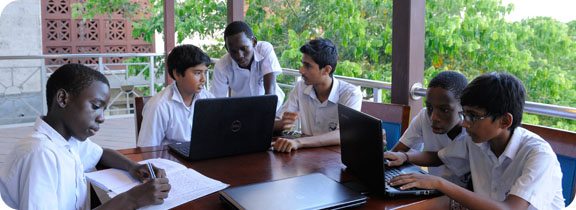
Academic Programme
The Aga Khan Academy Mombasa offers an education of an internationally recognised standard of excellence to prepare students to become intellectually curious, global-minded citizens of the world.
The Academy programme develops students who are committed to positive change and are able to understand and analyse complex issues of local, national and global significance.
Our curriculum is built on the framework of the International Baccalaureate (IB). The IB is a thorough, multidisciplinary curriculum that fosters:
- Intellectual curiosity
- Creativity
- Leadership development
- Social consciousness
- A pluralistic sensibility
The IB is also known for preparing students for admission to the best universities in their own countries and abroad.
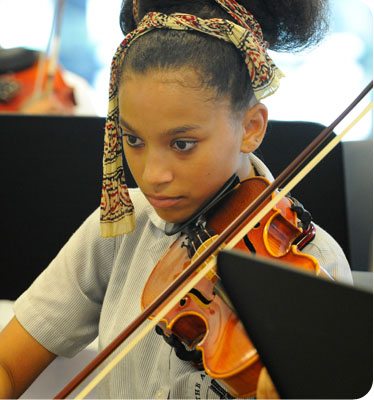 Our focus is on developing students' critical thinking skills and the ability to analyse issues. We also emphasise multicultural understanding and awareness. One of the ways in which we help our students develop skills for ethical leadership is through the Aga Khan Curricular Strands. These are cross-disciplinary areas of study that have been developed for the network of Aga Khan Academies.
Our focus is on developing students' critical thinking skills and the ability to analyse issues. We also emphasise multicultural understanding and awareness. One of the ways in which we help our students develop skills for ethical leadership is through the Aga Khan Curricular Strands. These are cross-disciplinary areas of study that have been developed for the network of Aga Khan Academies.
Overall educational programme
Our curriculum is complemented by co-curricular, athletic and community service initiatives. The overall educational programme is designed to educate well-rounded, civic-minded individuals. It enhances students’ academic excellence, leadership skills, sense of civic responsibility, understanding of global issues, and analytical and study skills. The programme also reinforces an understanding of local languages, history, cultures and environment.
When they graduate from the Academy, students are expected to be computer literate and have a thorough understanding of the diverse academic disciplines covered in the IB curriculum. They should have mastered at least two languages, including English. Through the planned international exchange programme, our students will be able to enhance their foreign language learning and appreciation of other cultures.
Our graduates are thus well prepared for the rigours of higher education and to pursue opportunities in an increasingly interdependent world.
For further information on the IB programmes offered at the Aga Khan Academy Mombasa please visit the following pages:
- Primary Years Programme (years 1–5)
- Middle Years Programme (years 6–10)
- Diploma Programme (years 11–12)
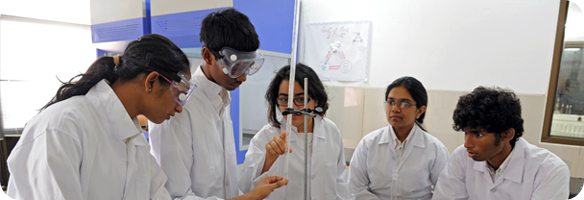
Academic Programme
The Aga Khan Academy Hyderabad offers an education of an internationally recognised standard of excellence to prepare students to become intellectually curious, globally-minded citizens of the world.
The Academy programme develops students who are committed to positive change and are able to understand and analyse complex issues of local, national and global significance.
Our curriculum is built on the framework of the International Baccalaureate (IB). The IB is a thorough, multidisciplinary curriculum that fosters:
- intellectual curiosity
- creativity
- leadership development
- social consciousness
- a pluralistic sensibility.
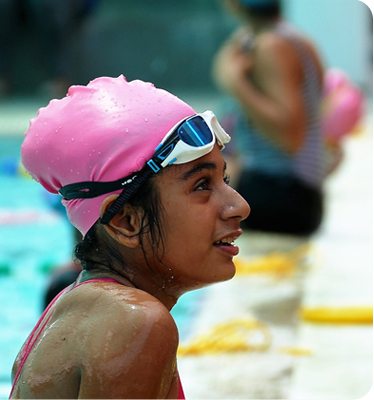 The IB is also known for preparing students for admission to the best universities in their own countries and abroad.
The IB is also known for preparing students for admission to the best universities in their own countries and abroad.
Our focus is on developing students' critical thinking skills and the ability to analyse issues. We also emphasise multicultural understanding and awareness. One of the ways in which we help our students develop skills for ethical leadership is through the Aga Khan Curricular Strands. These are cross-disciplinary areas of study that have been developed for the network of Aga Khan Academies.
Overall educational programme
Our curriculum is complemented by enrichment, athletic and community service initiatives. The overall educational programme is designed to educate well-rounded, civic-minded individuals. It enhances students’ academic excellence, leadership skills, sense of civic responsibility, understanding of global issues, and analytical and study skills. The programme also reinforces an understanding of local languages, history, cultures and environment.
When they graduate from the Academy, students are expected to be computer literate and have a thorough understanding of the diverse academic disciplines covered in the IB curriculum. They should have mastered at least two languages, including English. Through the planned international exchange programme, our students will be able to enhance their foreign language learning and appreciation of other cultures.
Our graduates are thus well prepared for the rigours of higher education and to pursue opportunities in an increasingly interdependent world.
For further information on the IB programmes offered at the Aga Khan Academy Hyderabad, please visit the following pages:
- Primary Years Programme (grades 1–5)
- Middle Years Programme (grades 6–10)
- Diploma Programme (grades 11–12).
